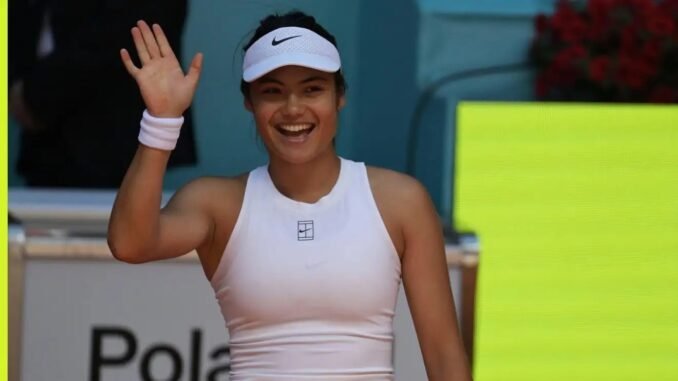
From the euphoric heights of a historic U.S. Open win to the grinding trenches of the WTA Tour, Emma Raducanu’s journey has been anything but linear. And now, in a rare moment of vulnerability, the 21-year-old British tennis star has opened up about the emotional and financial challenges she’s faced while trying to reclaim form—and reach a prize money milestone that once seemed inevitable.
In a candid interview following her latest tournament exit, Raducanu revealed that she’s struggling to find consistency, not just in her performance, but also in the financial side of life on tour. For a player who became a global superstar seemingly overnight in 2021, the reality of life after the fairy tale has proven much more complicated.
“It’s hard,” Raducanu admitted. “You start thinking you’re on a path to big things, and then things get bumpy. The prize money… the expectations… it all builds up.”
With mounting pressure, persistent injuries, and a rotating carousel of coaches, Emma’s recent years have been defined less by grand slams and more by grit, growth, and grappling with the weight of sudden fame.
The Rise: From Qualifier to Queen
Raducanu’s story is the kind that tennis—and sports—dream about. In 2021, at just 18 years old, she stormed through the qualifying rounds of the U.S. Open and went on to win the tournament without dropping a single set, becoming the first qualifier in history to claim a major title.
Instantly, she became a global sensation. Endorsement deals with Nike, Dior, HSBC, Porsche, and British Airways flooded in. She became the face of women’s tennis in Britain, a modern symbol of multiculturalism and a Gen Z icon. Many predicted she’d be the next Serena or Sharapova.
But sports narratives aren’t always fairy tales, and the pressure to live up to her sudden stardom brought with it immense challenges.
The Struggles: Injuries, Inconsistencies, and Identity
Since that stunning U.S. Open victory, Raducanu has failed to progress past the second round in any major tournament. She’s dealt with:
- Wrist and ankle injuries that sidelined her for months.
- Frequent coaching changes, with no long-term mentorship to anchor her.
- A media environment that oscillates between adoration and criticism.
Despite having one of the most lucrative endorsement portfolios in women’s sport, Emma made a startling admission: “The prize money isn’t what it used to be. You’ve got to win to earn, and I haven’t been doing enough of that.”
To date, her career prize money sits just shy of $4 million, a remarkable number for most, but in sharp contrast to the potential she showed in New York. Her performances haven’t kept pace with her fame, leading to scrutiny both on and off the court.
The Pressure of “Earning It” Again
One of the more nuanced aspects of Raducanu’s comments was her acknowledgment that endorsement money can only do so much.
“I never wanted to be famous for being famous. I want to win. I want to prove I belong at the top, not just because of one amazing tournament, but because I can do it again.”
Her remarks suggest an inner conflict. While the sponsorships provided security and visibility, they also created an image that perhaps outpaced her development as an athlete. The financial pressure now isn’t just about making money—it’s about validating it.
In tennis, prize money is the clearest metric of merit. You win, you earn. You lose early, you don’t. And for someone who burst onto the scene with a $2.5 million paycheck from one tournament, it’s humbling to face the grueling grind of weekly tour life where early exits mean financial stagnation and growing self-doubt.
Critics and Supporters: A Nation Divided
Public opinion on Raducanu in the UK and beyond has become polarizing. Some critics claim she’s been distracted by fame and brand deals, prioritizing celebrity over competition. Others argue she’s unfairly burdened by media narratives and that people forget just how young she is in the professional circuit.
“We forget she’s only just started her career,” said former British No. 1 Johanna Konta. “She’s had to grow up under a microscope.”
Many in the tennis community have rallied around Raducanu, calling for patience and a long-term perspective. Her talent is still undeniable, and flashes of brilliance in matches continue to draw attention from coaches and fans alike.
A Turning Point: The Path Forward
Despite the setbacks, Raducanu insists she’s not done—far from it.
“This is just the start. I know what I need to do now. I’ve been through the highs and lows, and I’m still standing.”
She’s currently working with a new coaching team and undergoing a tailored fitness regimen aimed at improving her durability throughout the calendar year. Her goal? To get healthy, gain momentum, and make deep runs in Grand Slams again.
More importantly, she wants to reclaim the feeling of earning her way through the ranks.
“The prize money doesn’t just represent the money—it’s about the wins. The sweat. The fight. That’s what I’m chasing.”
Legacy in the Making
Emma Raducanu’s career is a case study in the price of success—and what it takes to sustain it. The elusive prize money mark she’s chasing isn’t just a number—it’s symbolic of her quest to reestablish herself not as a one-hit wonder, but as a perennial contender.
For now, she remains one of the most watched figures in tennis, not because she wins every match, but because she’s fighting through the adversity of being human in an often inhumane sport.
And that, in many ways, might be a more compelling journey than her historic triumph ever was.
Leave a Reply